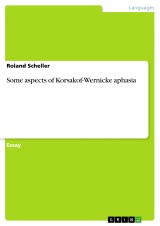Details

Some aspects of Korsakof-Wernicke aphasia
1. Auflage
|
CHF 15.00 |
|
| Verlag: | Grin Verlag |
| Format: | EPUB, PDF |
| Veröffentl.: | 25.01.2008 |
| ISBN/EAN: | 9783640094837 |
| Sprache: | englisch |
| Anzahl Seiten: | 11 |
Dieses eBook erhalten Sie ohne Kopierschutz.
Beschreibungen
Essay from the year 2000 in the subject Speech Science / Linguistics, grade: 2,0, Cardiff University (centre for language and communication), course: Communication disorders, language: English, abstract: Linguistics is a wide field. It consists not only of the analysis of the speech of healthy people and people that run through the educational system without any complications. One very important part of linguistics and communication studies is the analysis of communication disorders. But it might be assumed that people with communication disorders are only a small minority. But that is not true. In the UK there are for example more than four million illiterates. There are phenomena like autism or Alzheimer’s disease, a dementia. But some people suffer from aphasia and amnesia.
There is motor aphasia (e.g. Broca’s aphasia), sensory aphasia (e.g. Wernicke’s aphasia) and global aphasia. In this essay I will describe the so-called Korsakoff Wernicke aphasia (KWA), which is an aphasia combined with different types of amnesia. Amnesia is a memory disorder and this essay suggests that memory disorders have consequences for human communication and must therefore be also regarded as communication disorders. I will describe the characteristics of Korsakoff Wernicke aphasia, locate it in a diagram, mention some test methods for its appeal and cite case studies. Furthermore I will illustrate the memory defect with a memory model. Korsakoff’s syndrome is severe amnesia that is the result of strong alcohol abuse. Korsakoff’s syndrome is defined as “Korsakoff’s syndrome (Korsakoff’s psychosis): an organic disorder affecting the brain that results in a memory defect in which new information fails to be learnt although events from the past are still recalled, disorientation for time and place; and a tendency to invent material to fill memory blanks (see confabulation). The commonest cause for the condition is alcoholism, especially when this has led to deficiency of thiamin (vitamin B1). Large doses of thiamin are given as treatment. The condition often becomes chronic.[S.S. Korsakoff (1854-1900), Russian neurologist]”(Oxford Concise Colour Medical Dictionary, 1998).
There is motor aphasia (e.g. Broca’s aphasia), sensory aphasia (e.g. Wernicke’s aphasia) and global aphasia. In this essay I will describe the so-called Korsakoff Wernicke aphasia (KWA), which is an aphasia combined with different types of amnesia. Amnesia is a memory disorder and this essay suggests that memory disorders have consequences for human communication and must therefore be also regarded as communication disorders. I will describe the characteristics of Korsakoff Wernicke aphasia, locate it in a diagram, mention some test methods for its appeal and cite case studies. Furthermore I will illustrate the memory defect with a memory model. Korsakoff’s syndrome is severe amnesia that is the result of strong alcohol abuse. Korsakoff’s syndrome is defined as “Korsakoff’s syndrome (Korsakoff’s psychosis): an organic disorder affecting the brain that results in a memory defect in which new information fails to be learnt although events from the past are still recalled, disorientation for time and place; and a tendency to invent material to fill memory blanks (see confabulation). The commonest cause for the condition is alcoholism, especially when this has led to deficiency of thiamin (vitamin B1). Large doses of thiamin are given as treatment. The condition often becomes chronic.[S.S. Korsakoff (1854-1900), Russian neurologist]”(Oxford Concise Colour Medical Dictionary, 1998).
Diese Produkte könnten Sie auch interessieren:

Language Policy and Modernity in Southeast Asia

von: Antonio L. Rappa, Lionel Wee Hock An

CHF 118.00















